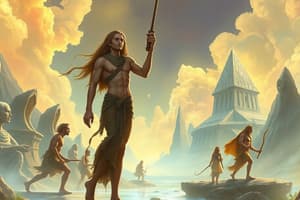Podcast
Questions and Answers
Australopithecus afarensis had large brains and human-like features.
Australopithecus afarensis had large brains and human-like features.
False (B)
The Paleolithic period is also known as the New Stone Age.
The Paleolithic period is also known as the New Stone Age.
False (B)
Cave paintings in France and Spain are examples of early artistic expression.
Cave paintings in France and Spain are examples of early artistic expression.
True (A)
The Agricultural Revolution led to a transition from settled communities to nomadic lifestyles.
The Agricultural Revolution led to a transition from settled communities to nomadic lifestyles.
Homo sapiens emerged as our ancestors 200,000 years ago.
Homo sapiens emerged as our ancestors 200,000 years ago.
The agricultural revolution allowed the population to grow exponentially.
The agricultural revolution allowed the population to grow exponentially.
The Inuit civilization is mentioned as one of the ancient civilizations in the text.
The Inuit civilization is mentioned as one of the ancient civilizations in the text.
The Renaissance era emphasized reason and individualism.
The Renaissance era emphasized reason and individualism.
Christianity originated in the Indian subcontinent.
Christianity originated in the Indian subcontinent.
The rise of globalization in the 20th century had no impact on our lives.
The rise of globalization in the 20th century had no impact on our lives.
Flashcards are hidden until you start studying
Study Notes
Unraveling Human History: A Journey Through Time
Human history is a tapestry woven from countless strands of stories, cultures, and events that span over millions of years. Like an intricate puzzle, each piece contributes to revealing a vast, complex, and ever-evolving narrative. In this exploration, we will trace our origins from the emergence of early hominids to the modern era, touching upon key moments that have shaped our world as we know it today.
Our Roots: Hominids and the Dawn of Humanity
The story of humanity starts around 2.8 million years ago, with the evolution of the first hominids. Australopithecus afarensis, known for their small brains and ape-like features, shared common ancestors with chimpanzees. Gradually, hominids diversified into different species, and by 200,000 years ago, our ancestors Homo sapiens emerged.
The Paleolithic Period: The Stone Age
In the Paleolithic period (Old Stone Age), humans relied on hunting, gathering, and scavenging for survival. Around 35,000 years ago, the development of advanced stone tools, such as hand axes and blades, signified an intellectual leap. Cave paintings in France and Spain from around 30,000 years ago, like Lascaux and Chauvet, demonstrate early artistic expression.
The Agricultural Revolution: Settling Down
The Agricultural Revolution, beginning around 10,000 BCE, marked the transition from nomadic lifestyles to settled communities. Humans began to cultivate crops, such as wheat and barley, and domesticate animals, such as sheep, goats, and pigs. This revolution allowed the population to grow exponentially, leading to the rise of civilizations.
Civilizations and Empires
In the Old World, ancient civilizations like Mesopotamians, Egyptians, and Indus Valley Civilization flourished. These societies left behind monumental structures, such as the Great Pyramids, the Great Wall of China, and the Terracotta Army, symbolizing their power and wealth.
In the New World, the Inca Empire, the Aztecs, and the Maya Empire exhibited remarkable engineering, agriculture, and architectural achievements. The Olmec, the first Mesoamerican civilization, emerged around 900 BCE, and the Maya, known for their mathematical and astronomical knowledge, later developed a complex written language.
The Rise of Religions and Ideologies
Religions, philosophies, and ideologies played a pivotal role in shaping human history. Ancient Greeks created the foundations of Western philosophy, while Confucianism and Taoism emerged in China. Hinduism, Buddhism, and Jainism began in the Indian subcontinent. Christianity, Islam, and Sikhism developed in the Middle East and Europe, later spreading throughout the globe.
The Renaissance and Enlightenment
The Renaissance, starting in the 14th century in Italy, marked a period of rebirth in the arts, humanities, and sciences. This era set the stage for the Enlightenment, a philosophical movement that emphasized reason and individualism, leading to the Age of Revolution.
Modern History: Globalization and Change
The modern era is characterized by globalization, industrialization, and technological advancements. The European colonialism and the Age of Discovery expanded European influence worldwide. The two World Wars and the Cold War shaped contemporary politics and society. The rise of globalization and technological advancements in the 20th century brought major changes to our lives, including the rise of the internet and the digital age.
Studying That Suits You
Use AI to generate personalized quizzes and flashcards to suit your learning preferences.




